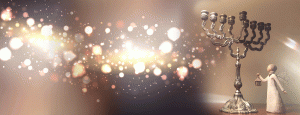This year (2016/5777) Hanukkah and Christmas fall on the same day. December 25 is Christmas Day, and also the first day of Hanukkah. So the question is, Do these two holidays have anything in common?
Although the two holidays have completely different backgrounds, they are both “festivals of light.” Both are celebrating that the light triumphed over the dark, and the good over the evil.
In John 10:22 we read: “It was winter, and the festival of the Dedication was being held in Jerusalem.” From this verse in John we learn that Jesus was in Jerusalem, in the temple, for the feast of Hanukkah.
Hanukkah commemorated the cleansing of the temple under Yehuda Maccabeus in 164 BC. Antiochus Epiphanes had defiled it by sacrificing a pig on the altar of burnt offering. According to the Jewish calendar, the festival falls in November/December, when it is wintertime in Israel.
temple under Yehuda Maccabeus in 164 BC. Antiochus Epiphanes had defiled it by sacrificing a pig on the altar of burnt offering. According to the Jewish calendar, the festival falls in November/December, when it is wintertime in Israel.
We can read about the story of Hanukkah and the Maccabees in the second book of Maccabees. The first and second books of the Maccabees might not be known to all readers of the Bible, because the apocryphal books to the Old Testament (or the Deuterocanonical books, ca. 200 BC) are not included in all Bibles. In the Protestant tradition, the translation of the Bible is from the Hebrew Scriptures, which did not include the Old Testament Apocrypha in their canon. This is in contrast to the Catholic and Orthodox traditions, which used to translate the Bible from the Greek translation of the Old Testament, called the Septuagint (LXX). In the second century BC, when the Greek translation of the Old Testament was done, there was no canon of the Holy Scriptures and the apocryphal books were included.
In 2 Maccabees 10:8 we read: “They decided by public edict, ratified by vote, that the whole nation of the Jews should observe these days every year.” The temple was rededicated by the Maccabees on the 25th of the month of Kislev in 164 BC, after being desecrated for three years.
The Maccabees had revolted against the enforced Hellenization of the Jewish people. The Hellenistic culture was a formidable challenge to Judaism and the Jewish people. The Maccabean fighters would rather give up their lives than deny the God of Israel, and saved Judaism from extinction at a crucial time.
So the Hanukkah story is a story about the temple, the center of Judaism. Very important things happened between the Old and New Testaments, and the story of Hanukkah is one of them. The great historical drama which took place in the 160s BC is also essential for understanding the origin of the Jesus movement and the early church.
The Hanukiah, the eight-armed candlestick, is the symbol of Hanukkah. Each evening for eight days one light is lit. During Hanukkah, the people asked Jesus how long he would keep them in suspense about who he is. The people were wondering if he could be the Messiah, the Light which was promised to the world. In the beginning of the Gospel of John we read: “In him was life, and the life was the light of all people. The Light shines in the darkness, and the darkness did not overcome it.”
Both Christmas and Hanukkah are festivals of light during a dark winter month. Hanukkah commemorates the dedication of the temple in Jerusalem, and Christmas commemorates he who is greater than the temple and who gives light to all humankind—not only for eight days, but for this life and beyond.